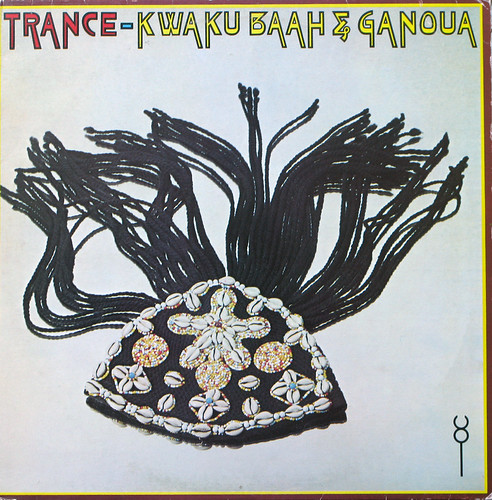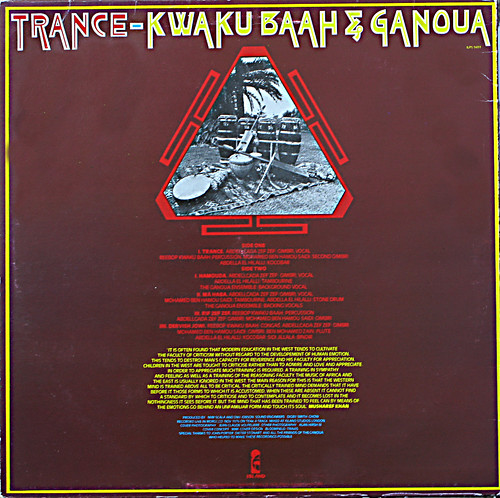
Here is an album that bridges English avant-pop music and something approaching ethnomusicology. It is also an artifact of a now-distant time, when hippies with an intellectual bent could pilot Land Rovers around Africa looking for both new sounds and a proprietary buzz to go with the music they'd discovered.
Steve Winwood plugged an important component into the second iteration of his group Traffic as the '70s began: a Ghanaian percussionist he found in Sweden, Anthony 'Reebop' Kwaku Baah. A merciless conga player, a good cook by all reports, most certainly an all-stops-out hedonist, Reebop made the front line of Traffic much fun to experience in the glam '70s, an era captioned by Traffic's Low Spark of High-Heeled Boys. He countered the band's innate tendency to experiment in concert and so meander; I will borrow Brian Eno's phrase and describe Reebop as Traffic's direct-inject anti-jazz ray gun. Reebop was also, to reiterate, a hedonist. By the time Traffic wound to a halt in mid-decade, as Winwood recalled, "[Reebop] was so out of it, he insisted on singing during every song." The band gave Reebop an unplugged microphone.
After Traffic, Reebop joined the German avant-garde group Can for the one album (without Can founder Holger Czukay) that Can enthusiasts still avoid discussing. However, "Masimbabele," a fantastic single recorded with two Cologne musicians calling themselves The Unknown Cases, turned up on the Rough Trade label in the early '80s. Reebop takes the lead vocal on this record and his singing comes off, surprisingly, as likeable. "Masimbabele" was later issued as part of WOMAD Talking Book Vol. Two: An Introduction To Africa. Reebop died in 1983, probably from the condition author Eve Babitz identified as over-boogie. Reebop had also worked on a solo project, unfinished at the time of his death.
In between his stints with Traffic and Can, Reebop Kwaku Baah entered into collaboration with musicians from the Ganoua (or G'noua), a mystical sect resident in North Africa whose roots may be traced across the Muslim diaspora to the Sudan. The album resulting from that collaboration, Trance, bookmarks the waning moments of an era when a pop record label of significance (in this case, Island Records) could issue foreign language songs played jointly by an African drummer and some hill people from Morocco.
The project was conceived and brought to fruition by Mim Scala, one of the 1200 or so humans who actually got to live the 'Swinging London' lifestyle during the mid-'60s. Scala had been a manager and agent and record company A&R, had socialized with artists and pop stars and gangsters (as one does); a high diver of the low life, Scala specialized in being wherever one was supposed to be in the halcyon days of rock stardom. Brian Jones of the Rolling Stones was a friend (comparisons between Scala and Stones manager Andrew Loog Oldham are inevitable). Having returned from Morocco with tapes of the Master Musicians of Jajouka, Jones confided to Scala that music from other mystical sects lurked elsewhere in the Atlas Mountains. Subsequently, Jones died in 1969. His much-remixed tapes would eventually surface as the first release on Rolling Stones Records some three years on. In '69, Mim Scala ducked out of a London coming down from its high and hit the pot trail. What followed remains the stuff of hoary cliché: the Land Rover, the spiritual quest, the exotic girlfriend, the antipodal terrain, the fabulous dope, the amazing connections...
The notion of recording ritual music in Morocco stayed with Mim Scala. In 1975 Scala, then a shaggy itinerant but ever the scenemaker, coordinated a recording date in Tangiers involving both Reebop and a select group of Ganoua musicians. Several photos documenting the occasion may be found on Scala's cob-website, including one framing a topless blonde lady of fairly happening mien traversing the sand dunes next to Mim. He seems oblivious to her presence. Priorities being what they were back in the day, Mim is carefully toting his hookah to the next tent.
The sessions comprising Trance, like Brian Jones' recordings from Jajouka, were initially made on a four-track tape machine (Jones used a Uher; Scala, six years later, employed a Teac) then mixed to stereo in a London studio. The results were not overtly psychedelic, as with the phase-shifting and non-linear audio content of the album produced by Jones and engineer George Chkiantz. Still, Trance exudes its own druggy miasma. Those listeners with a past, as I'll euphemize, will probably experience sympathetic cottonmouth by the end of the title track, which spanned one side of the original vinyl pressing. The album whose sound best compares with today's offering — a signature laminate of moist reverb, off-mic incantations and other artifacts of reoriented consciousness —is probably Gris-Gris, the 1968 debut Atco label lp by Dr. John the Night Tripper. Though Dr. John had been a session player for Phil Spector, the New Orleans pianist's entrée into making records for hippies sounded like an arcane rite conducted in a graveyard…after a flood. He, too, knew the meaning of value added entertainment.
Trance, like Gris-Gris, is equal parts smoke and rising damp, music as chimera. The congas telegraph their presence seemingly several feet down a tiled hallway. Chants kick-start, then fade into rhythmic mumbling. Most of the album's five songs peg their mysteries to the buzzing gimbri, an acoustic bass guitar made from wood and leather, with metal resonators, that forms the melodic spine of Trance. Every one of these tracks is charged with subdued intensity, which in turn gives way to naked intensity.

In his notes, Mim Scala offers "The album Trance is the music of a separate reality. I hope to see you there." There may be no 'there' there anymore, not as Mim might have experienced it then, not in today's world. There is, however, a near-tangible reminder of Mim's 'there' in each fuzzy note and conga pop of Trance. He did get that much right and as such is owed a debt of gratitude by the proprietor of NCIP and its readership. Messages and potent imagery are embedded in this music. The Ganoua believe that music can have external meaning. This notion embarasses ethnomusicologists, but doesn't trouble the musicians. They believe that the gimbri speaks to them, and to the spirits surrounding them. Appropriately, Trance can trigger synesthesia, even at a remove in time. Listen closely and you may smell hash oil, kif smoke, roasting goat meat, estrogen, sweat and the vapors of petrol leaking from a crashed Land Rover.
Trance mesmerizes as great liturgical music should, even as it stains the air with a palpable sense of loss and evanesence. Writing in his best collection of short stories, Jesus' Son, author and fifth-gear hedonist Denis Johnson nailed the feeling with a scant few words:
That world! These days it's all been erased and they've rolled it up like a scroll and put it away somewhere. Yes, I can touch it with my fingers. But where is it?
TRANCE
Comments
many thanks
i don't suppose anyone out there can upload 'masimbabele'?
as you say… a fantastic tune
So Thanks again for digging trance up
Nice
Mim Scala
Wow, I appreciate this more than you know. In 1976, Reebop(who was called Kabaka) was working on a solo album for Island Records. I was brought in after basic tracks were recorded for re-mix and post production. I imagine this is the "solo project) you spoke of that was unfinished at his death. I do remember some great times in Nigeria with Kabaka, who got more out of his 38 years than many do out of three score and 10. Does anyone out there have any of the unreleased Island tracks from the mid-70's???
I try nott to lett itt hinder me to express.
I vas working with Rebop before he died at Fatt Records he made a recording att the Matrix studio with swedish base player Jonas Hellborg any one know if itt has been relised. Meting with Antony and trying to estavlish this rekord company wass a grait time. And i will never forget his personalety. Unfortunetly he died before we managed to akomplish any thing. I atended his funeral in sweden and it was a sad hut butifol moment.
Rebop never got the credit he deserved and itt is a shame too see how typickli the working black musishians newer getts the same credd ass the stars. The Reebop storry tell me we must not forgett the littel man ore womman. Hee vas bigger than his rebutashion and thiss in a progressiv musik era. Still forgotten and nott akredited for vat he acomplisht. He told me that he wass velkomd upp to jamm in on stage in Jazz Clubbs but he still wsa mad pay att the dor.
Let oss ohnner Rebop by lissening to more nusik of mainstrem and atend meny lokal music events.
I like to obtain information om Rebop musik that is availibul.
Håkan.
I wrote the piece about traveling with Kabaka-Reebop in West Africa in 1977. I have a music project in Los Angeles called the Kabaka Gnawa Project dedicated to the healing music he played and witnessed. If you or anyone else is interested in more info, e-mail
KGP@thealsaisgroup.com.
Kabaka lives.
For a more modern fusion rooted in Gnawa trance but with other 60's and 70's influences check out Nass El Ghiwane. Its awesome stuff, and whenever I hear it I am instantly back in a smoky Chefchaoene cafe looking out over the hills. JilJilala and Lambacheb are two other interesting groups from the 70's and 80's. Gnawa Diffusion is a current modern Gnawa-fusion group
with heavy reggae and world music influences. Not really trance.
Honestly, any tape shop in Fes can pull out some classic trance for you, theres a lot of it out there, and now that Ryanair flies to Morocco for 20 euros from France and Spain, whats your excuse?
I'll be in Marakech in 6 days!
The other two Gnawa musicians have since stopped playing.